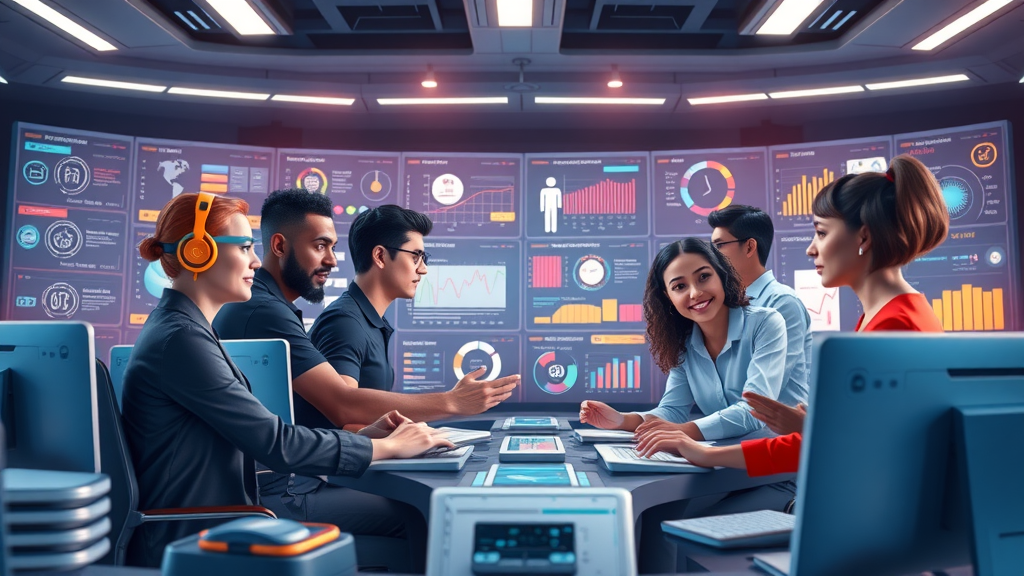Did you know over 80% of consumers are more likely to buy from brands offering AI-driven personalized marketing ? That’s not just buzz—it’s a revenue surge waiting to happen. In today’s digital landscape, personalized marketing with AI is more than a competitive edge; it’s the very foundation of modern customer engagement and business growth. If you want to turbocharge your marketing results and see real, measurable improvement fast, this guide breaks down the proven, practical strategies every marketing team needs.
Unlocking ROI: The Surprising Power of Personalized Marketing with AI
The true impact of personalized marketing with AI can be seen in every stage of the sales funnel, driving deeper engagement, higher conversion rates, and long-lasting customer loyalty. Today, marketers can harness AI personalization tools to analyze customer data in real time—identifying patterns, predicting user behavior, and instantly tailoring content to fit each interaction. This approach delivers a seamless and relevant experience for every customer, across email marketing, social media, and beyond.
Over 80% of consumers are more likely to buy from brands that offer personalized marketing with AI-driven experiences. This transformative impact on revenue and engagement highlights why personalized marketing with AI is no longer optional.
- Learn essential strategies to rapidly enhance your marketing team’s results and deliver unmatched customer experience.
- Discover how marketing personalization maximizes ROI and strengthens your competitive advantage.
- Unlock the secrets to data-driven, AI-powered personalization that adapts to your customer segments in real time.

Why Personalized Marketing with AI is Redefining Customer Experience
AI personalization is fundamentally changing the way brands connect with consumers. By leveraging machine learning and predictive analytics, marketing personalization ensures that every buyer’s journey is tailored, from the first touch to post-purchase support. Brands using these technologies set new standards for customer satisfaction, building loyalty with personalized experiences that reflect individual preferences, interests, and behaviors.
Beyond simple customization, powered personalization means every piece of messaging is context-aware and perfectly timed—leading to a profound jump in customer engagement and satisfaction. AI tools enable marketers to recognize subtle shifts in customer behavior, adapting content and offers on the fly. As a result, customer experiences evolve from generic to genuinely relevant, driving both short-term conversions and long-term brand loyalty.
How AI Personalization Transforms Every Customer Touchpoint
AI-driven marketing strategies ensure customers feel uniquely valued at each touchpoint of their journey. From dynamic email content to predictive product reco engines, personalization updates in real time to reflect the most current customer data and evolving needs. By understanding user behavior, AI algorithms help marketing teams deliver timely, relevant offers that genuinely resonate. This integrated approach nurtures trust while guiding customers toward conversions.
Whether it’s through chatbots providing personalized service or social media campaigns adapting content for specific segments, ai personalization enhances the visibility and effectiveness of every marketing effort. The net effect? Customers receive a cohesive brand experience—one that feels individually crafted at every click, view, and interaction.
Customer Experience Enhancement Through Personalized Experiences
Personalized marketing with AI isn’t just about pushing products; it’s about delivering experiences that adapt as customer preferences shift. Machine learning evaluates complex patterns in data collection, helping brands anticipate and address needs even before customers articulate them. This proactive service leads to consistently high satisfaction rates and improved retention.
Personalized experiences increase engagement by connecting on a deeper, emotional level. With the right mix of data insights and creative content, AI-powered strategies empower marketing teams to ensure every touch—be it an ad, an email, or a customer service chat—feels intentionally crafted for the individual. As a result, customers are far more likely to return and recommend.
| Metric | Traditional Personalization | AI-Powered Personalization |
|---|---|---|
| Engagement Rate | 35% | 65%+ |
| Conversion Rate | 2.5% | 5%+ |
| Efficiency Improvements | Limited (manual updates) | High (real-time, automated) |

Customer Data, Machine Learning, and the Science Behind Personalized Marketing with AI
The backbone of personalized marketing with AI is a unique blend of data collection, advanced algorithms, and continuous learning. Gathering relevant customer data —from browsing habits to transaction histories—fuels marketing personalization efforts and powers the machine learning engines behind every AI tool on the market. Here’s how the process works and why it’s revolutionizing the way brands connect with audiences.
Collecting and Leveraging Customer Data for AI Personalization
Every personalized customer journey begins with thoughtful data collection. Organizations leverage first-party and third-party data sources—such as website analytics, purchase histories, and app interactions—to build granular customer profiles. With the right protocols in place, this wealth of information lays the groundwork for meaningful segmentation and tailored outreach.
Data alone isn’t enough. The true magic happens when businesses apply advanced AI algorithms to this customer data, surfacing hidden trends and actionable insights that humans might overlook. Used responsibly, these insights empower brands to deliver value—ensuring that every marketing campaign feels like a perfectly timed, one-on-one conversation rather than a generic broadcast.
How Machine Learning Powers Marketing Personalization
Machine learning algorithms are the engine that turns raw customer data into highly targeted marketing strategies. Over time, these models recognize evolving customer behavior—dynamically adjusting recommendations, messages, and offers. This constant iteration gives marketers the power to not just personalize once, but to tailor and re-tailor in real time, maximizing engagement and conversion.
What sets AI personalization apart is the ability to learn from every customer interaction. By analyzing past responses, AI tools predict what content or product reco will perform best for each segment or even individual. This predictive capability accelerates ROI, making marketing campaigns more cost-efficient and much more effective.
The Role of Data Collection in Powered Personalization
Data collection is the critical first step in powered personalization. Without robust data pipelines and clear consent management, attempts at marketing personalization fall flat. Marketers should invest in transparent data practices, putting customer trust and privacy at the center of their strategy.
The most successful marketing efforts combine high-quality data with sophisticated algorithms to provide a real-time, 360-degree view of the customer. This holistic approach not only personalizes marketing campaigns but strengthens every other area, from product reco to service resolution.
“AI-driven personalization turns raw customer data into actionable insights that improve customer experiences and boost ROI.” — AI Marketing Expert

Segmenting Audiences for High-Impact Personalized Marketing with AI
Audience segmentation is the blueprint for high-impact personalized marketing with AI . By organizing customers based on shared attributes, behaviors, and preferences, AI-powered marketing teams can craft messaging and offers that speak directly to each customer segment. In a world where customers expect relevance at every click, dynamic segmentation is no longer a nice-to-have—it’s essential for staying competitive.
The Importance of Customer Segment Analysis in AI Personalization
With AI-driven tools, marketers can analyze customer segments at an unprecedented level of detail. Instead of broad, demographically defined groups, segments now reflect a blend of interests, purchase history, real time intent signals, and user behavior. This deep segmentation is what makes marketing personalization possible, enabling teams to deliver meaningful, timely interactions to every group.
Thorough segment analysis also helps identify high-value customers and underserved niches, guiding investment and creative strategy. Marketing teams that leverage these insights consistently outperform rivals—experiencing higher engagement, greater satisfaction, and stronger ROI from each campaign.
Optimizing Marketing Strategies through Dynamic Segmentation
Dynamic segmentation powered by machine learning and artificial intelligence allows marketers to move beyond static, one-size-fits-all customer lists. Instead, segments evolve in real time—updating as new data arrives—to ensure every interaction feels fresh and relevant. Machine learning models quickly identify changes in interests, intent, or even life stages, automatically shifting customers between segments for optimal messaging.
As a result, brands using dynamic segmentation enjoy higher conversion rates and more efficient marketing efforts. Marketing automation, AI personalization, and personalized content all become more effective, because they’re rooted in a living, breathing understanding of the customer.
Creating Personalized Experiences for Each Customer Segment
Once segments are defined, the next step is delivering unique, value-rich experiences for each group. AI tools leverage segment-specific insights to suggest the ideal product reco, tailor messaging across channels, and adapt creative elements for maximum impact. Whether designing an email campaign, a Facebook ad, or an in-app recommendation, AI ensures every detail feels relevant to the customer segment.
Advanced teams take personalization further—A/B testing content for each segment, using feedback to refine strategies, and layering in behavioral triggers. Over time, segments become more rewarding, with each interaction deepening brand affinity and driving ROI.

Personalized Content and Campaigns in AI-Driven Marketing
Creating and delivering personalized content is the heart of AI-driven marketing. Artificial intelligence transforms static campaigns into dynamic, interactive journeys. Instead of guessing what will resonate, marketing teams use data and AI to curate, automate, and optimize every aspect of their messaging for each customer segment.
Curating Personalized Content with Artificial Intelligence
Artificial intelligence tools scan vast troves of data to determine which topics, product reco, and messages are most likely to spark engagement. Using natural language processing and predictive analytics, marketers generate and select the most relevant images, wording, and calls to action—on the fly, for each individual. This automated content curation saves time, increases response rates, and makes every marketing campaign more human, not less.
Personalization engines can adapt website content, automate social media posts, and tailor in-app experiences in real time. AI recommendations ensure that every piece of content is personalized for the intended customer segment, with continuous improvement based on incoming data and customer feedback.
Executing Marketing Campaigns with AI Personalization
Campaign execution has never been smarter. Powered personalization means AI algorithms test, deploy, and optimize messaging across email marketing, social media, and content marketing channels without constant human intervention. Marketing automation frees teams from repetitive tasks, allowing them to focus on creative strategy and customer resonance.
Meanwhile, AI tools monitor results in real time, making adjustments to offers, frequency, and targeting as soon as new data emerges. This results in higher open rates, stronger click-throughs, and more conversions from every marketing campaign, at scale.
Best Practices for Marketing Automation using Powered Personalization
To get the most from AI-driven marketing automation, consider a few best practices: First, ensure you are collecting high-quality, consented customer data. Next, segment audiences based on both static demographics and dynamic, behavior-based signals. Third, set clear goals and KPIs to guide AI campaign optimization. Finally, iterate frequently—AI works best when it learns from fresh feedback and performance metrics.
With these foundations, powered personalization transforms every marketing effort into a living, evolving experience that meets customers where they are, every time.
“Personalized campaigns powered by AI redefine engagement, making every interaction relevant and timely.” — Digital Marketing Leader

Supercharging Product Recommendations with Personalized Marketing and AI
Product recommendations (“product reco”) have become one of the most profitable applications of personalized marketing with AI . By leveraging past purchases, browsing data, and segment analysis, marketing teams can deliver hyper-relevant product reco at scale, driving both upsells and customer satisfaction. The science behind these recommendations relies on advanced machine learning and user-centric algorithms.
Delivering Seamless Product Recommendations Using AI Personalization
AI-driven product reco engines analyze real time data and customer journeys to present the ideal suggestions at just the right moment—online, in-app, or through email marketing. These recommendations feel authentic, increasing conversion rates and average order values by anticipating what customers want before they ask.
Machine learning actively refines recommendations based on changing preferences, browsing patterns, and segment membership, making each interaction feel unique and valuable. The result: customers stay longer, spend more, and develop a stronger affinity with the brand.
Utilizing Customer Data and Machine Learning for Product Reco Success
The most successful product reco strategies use both explicit (purchase data) and implicit (click paths, search queries) customer data. Machine learning algorithms identify cross-sell and upsell opportunities, prioritize them by likelihood to convert, and present them within the most appropriate marketing channel.
Marketing teams see measurable ROI as personalization engines test, learn, and optimize product reco in real time. Satisfied customers are more likely to return—and recommend the brand to others.
Case Study: AI-Driven Product Recommendation That Doubled ROI
Consider an e-commerce retailer that integrated personalized marketing with AI into their product recommendation engine. By combining historic purchase data with live user behavior and machine learning, they saw click-through rates on recommendations rise by 150% and overall sales jump by more than 30%. Their marketing campaigns felt more relevant, and their ROI doubled within just a quarter.
This story is becoming the norm across industries—retail, travel, finance, and technology—showing the unmatched potential of powered personalization for every marketing team.

AI Personalization Across Channels: Email, Social Media, and Beyond
Effective marketing personalization is omnichannel by design. The best AI solutions orchestrate campaigns seamlessly across email marketing, social media, SMS, and more. Synchronization ensures each message is coordinated, consistent, and optimized for the unique engagement style of every channel—and every customer.
Email Marketing Automation for Personalized Experiences
Email marketing remains the highest-ROI channel—and AI amps up performance even further. With real time behavioral triggers, content personalization, and dynamic A/B testing, marketers can send the right email to the right person at the ideal moment. Automated workflows powered by AI platforms ensure no opportunity is missed and every customer journey is as engaging as possible.
Enhancing Social Media Campaigns with AI Personalization
AI-driven social media tools analyze customer data from likes, shares, and comments to identify trending interests. Platforms then customize audiences, images, and ad copy to fit each segment. Posts are timed for maximum visibility, consistently increasing engagement and conversion rates by making every social interaction uniquely appealing.
Brands leveraging AI for marketing efforts on social media gain critical competitive advantages—adapting content on the fly, testing creative hypotheses, and drawing actionable insights from real time analytics.
Integrating AI-Driven Personalization into Multichannel Marketing Efforts
The real potential of personalized marketing with AI shines when multiple channels work in harmony. AI tools track and learn from every touchpoint, creating a feedback loop that enhances future marketing automation efforts, personalizes product reco, and maximizes customer experience.
By integrating email marketing, social campaigns, website experiences, and customer service into a unified AI-powered personalization solution, brands can deliver a truly cohesive and memorable customer journey across the board.

Building a Data-Driven Marketing Team for Personalized AI Strategies
Implementing personalized marketing with AI demands more than technology—it requires a marketing team ready to embrace data, agile thinking, and continuous learning. Equipping your staff to get the most from machine learning, customer data, and powered personalization tools ensures sustainable growth and ROI.
Empowering Your Marketing Team to Harness AI Personalization
Empowerment starts with organizational buy-in and hands-on upskilling. Marketing teams should be trained not only on the mechanics of AI tools, but on interpreting their insights and translating data to creative execution. This collaborative approach might include workshops, live demonstrations, or vendor partnerships.
Leadership sets the tone by fostering a culture where experimentation and feedback are valued—and where every campaign is an opportunity to learn.
Training and Skillset Shifts for Powered Personalization
As AI becomes a bigger part of daily marketing efforts, skillsets must evolve. Today’s marketers need fluency in analytics, customer data interpretation, and creative storytelling within powered personalization platforms. Continued education on AI, machine learning, and privacy requirements keeps the team ahead of the curve.
Teams benefit from role specializations—such as data analysts, content strategists, and campaign optimizers—all collaborating under a shared vision for marketing personalization.
Aligning Customer Service and Personalization Initiatives
Customer service is an underappreciated ally in marketing personalization. AI-powered service tools can analyze support interactions to uncover new trends, segment customers, and provide vital feedback on marketing campaigns. Bringing service and marketing teams together multiplies the effectiveness of both, ensuring the customer experience is positive from first impression to post-sale support.

Overcoming Challenges in Personalized Marketing with AI
As powerful as personalized marketing with AI can be, brands must address challenges around data privacy, ethics, and compliance. Transparency, protection, and responsible use of customer data should be at the heart of any AI-powered marketing strategy.
Addressing Data Privacy and Compliance in AI Personalization
Marketing teams must comply with regulations like GDPR and CCPA, ensuring customer data is always handled with care and explicit consent. Build robust data protection policies, regularly audit your data pipelines, and select AI vendors who prioritize privacy and security. Every customer has a right to know how their data is collected, stored, and used within marketing automation and personalization campaigns.
Transparent privacy practices not only keep your business compliant—they foster trust and loyalty among segments sensitive to privacy.
Ensuring Ethical Use of Customer Data for Personalized Experiences
Beyond compliance, marketers are responsible for ethical choices about how AI personalizes content, offers, and recommendations. This means algorithmic transparency, customer control over data, and avoiding manipulative or discriminatory practices. Share how you use AI personalization openly with your customers, and always provide simple ways to opt out or adjust preferences.
When customers believe personalization adds value (not just sales pressure), brands build trust and long-term relationships.
- Data protection
- Algorithmic transparency
- Consent management

Five Actionable Steps to Launch Personalized Marketing with AI
- Audit your current marketing data sources
- Invest in the right AI-powered personalization platforms
- Segment your audience with machine learning tools
- Develop targeted, personalized content and product recommendations
- Monitor, analyze, and optimize your AI marketing efforts

Measuring ROI: KPIs and Analytics for Personalized Marketing with AI
No marketing strategy is complete without robust measurement. The best AI tools not only deliver personalized experiences, they report on the concrete KPIs that matter—ROI, engagement, conversion, and efficiency. Analytics dashboards simplify decision-making, helping teams fine-tune marketing efforts and forecast future outcomes.
Defining Key Performance Indicators in Marketing Personalization
KPIs to track include engagement rate (clicks, opens, shares), conversion rate (purchases, sign-ups), and efficiency improvements (time saved, reduction in marketing spend). Set targets for each campaign and track results persistently. AI platforms can also provide predictive metrics—estimating the likely impact of strategy shifts in advance.
Tracking Customer Experience, Conversion, and Engagement Metrics
Customer experience can be measured via satisfaction surveys, NPS, or support feedback. Conversion and engagement are tracked through real time dashboards, which tie every marketing effort back to business growth. Over time, you’ll see which tactics and segments create the strongest long-term ROI.
Continuous Improvement Through Artificial Intelligence Analytics
The real power of AI lies in its capacity for ongoing learning and improvement. Each campaign informs the next, with AI tools adapting to new data and market changes, so your strategies remain future-proofed and increasingly effective. Refine KPIs as you go, and never stop optimizing.
Case Studies: Real-World Success Stories in Personalized Marketing with AI
Let’s look at how leading brands are leveraging AI personalization to achieve business breakthroughs.
E-Commerce Product Recommendations and Sales Uplift
A major online retailer implemented AI-driven product reco based on real-time browsing and transaction data. As a result, their email and on-site recommendations became hyper-targeted—leading to a 40% increase in click-through rates and a 25% increase in repeat purchases within six months.
Effective AI Personalization in Social Media Campaigns
A fashion brand utilized AI tools to analyze user behavior and optimize Instagram and Facebook campaigns. Ads became immediately more relevant to each segment, resulting in doubled engagement and a major reduction in ad spend waste.
Boosting Customer Service and Retention through Personalized Content
A SaaS provider used AI personalization tools in both marketing and customer service touchpoints. Personalized onboarding content, proactive support, and tailored offers cut churn in half and increased upsell rates, all powered by insights from integrated customer data.
Future Trends: Evolving Personalized Marketing with AI and Powered Personalization
The future of marketing lies in smarter, faster, and more intuitive AI personalization. As technology evolves, so will the opportunities for marketing teams to create ever more seamless and meaningful customer journeys.
Emerging AI Technologies in Marketing Personalization
Cutting-edge advancements like deep learning, natural language processing, and image recognition are pushing the boundaries of what AI can do in content curation, product reco, and interaction management. Voice assistants and AR shopping are on the horizon.
Long-Term Impact of AI Personalization on Customer Experience
Over time, AI-driven marketing personalization will lead to highly anticipatory service—where every customer feels understood and catered to before they even ask. The winners will be those teams who invest early and keep optimizing.
How Marketing Teams Can Prepare for Rapid Change
Prioritize a learning culture, invest in flexible AI platforms, and encourage cross-team sharing. Set processes that let your team test, learn, and pivot fast, so you can ride the wave of powered personalization’s growth.
Video: How Personalized Marketing with AI Improves Customer Experience
Watch to see real examples of brands using AI personalization to deliver next-level customer experiences across every channel.
Video: Best AI-Powered Personalization Tools for Marketing Campaigns
This video breaks down leading AI personalization platforms—what features they offer, where they work best, and how you can start using them in your own marketing campaigns today.
People Also Ask: How is AI used in personalized marketing?
- AI is used in personalized marketing by analyzing vast amounts of customer data, identifying patterns in customer behavior, and delivering targeted messages, product recommendations, and experiences across multiple channels with machine learning algorithms.
People Also Ask: How is AI used in personalized shopping?
- AI enhances personalized shopping through product recommendations, predictive analytics for inventory, virtual shopping assistants, and personalized offers based on past purchase history and customer segment with powered personalization.
People Also Ask: How is AI used in personalized learning?
- In personalized learning, AI adapts content delivery, pacing, and assessments to individual learners’ needs, using data collection, machine learning, and powered personalization technologies to maximize comprehension and engagement.
People Also Ask: How to personalize with AI?
- Personalization with AI involves collecting customer data, segmenting audiences, applying machine learning insights to craft targeted content, and continuously optimizing marketing efforts to enhance customer experience and conversion rates.
Frequently Asked Questions About Personalized Marketing with AI
- What industries benefit most from personalized marketing with AI? AI-powered personalization is effective in e-commerce, finance, hospitality, SaaS, healthcare, and more—any sector where individual customer experience matters.
- How secure is customer data in AI personalization? Security depends on vendor practices and compliance with laws like GDPR/CCPA. Choose AI platforms with robust encryption, privacy policies, and consent management tools.
- What is the best AI platform for marketing personalization? Leading platforms include Salesforce Einstein, Adobe Sensei, Dynamic Yield, and HubSpot, but the best fit depends on your business needs and data integration requirements.
- Can small businesses implement personalized marketing with AI? Yes! Many AI tools offer scalable pricing and easy integration, making advanced marketing personalization accessible even to companies with smaller budgets or teams.
Key Action Points to Implement Personalized Marketing with AI Now
- Identify your marketing team’s AI readiness
- Set clear goals for marketing personalization
- Start with a pilot project for a key customer segment
- Track ROI and iterate quickly
Recap and Next Steps for Business Growth Using Personalized Marketing with AI
- Harnessing AI personalization for marketing personalization and powered personalization is the proven path to faster ROI, higher customer engagement, and long-term competitive advantage. Start optimizing your marketing personalization approach today to lead the market.
To deepen your understanding of personalized marketing with AI, consider exploring the following resources:
-
“AI-Based Marketing Personalization: How Machines Analyze Your Audience” : This article delves into how AI and machine learning enhance customer segmentation and engagement through personalized emails, tailored recommendations, and dynamic content. ( marketingaiinstitute.com )
-
“How Is AI Personalization Redefining Modern Marketing Strategies?” : This piece examines practical applications of AI in marketing, including personalized emails, tailored product recommendations, dynamic website content, and predictive analytics, highlighting how AI-driven personalization enhances user engagement and customer experiences. ( b2bdaily.com )
These resources provide valuable insights into leveraging AI for personalized marketing strategies, offering practical applications and real-world examples to enhance your marketing efforts.
